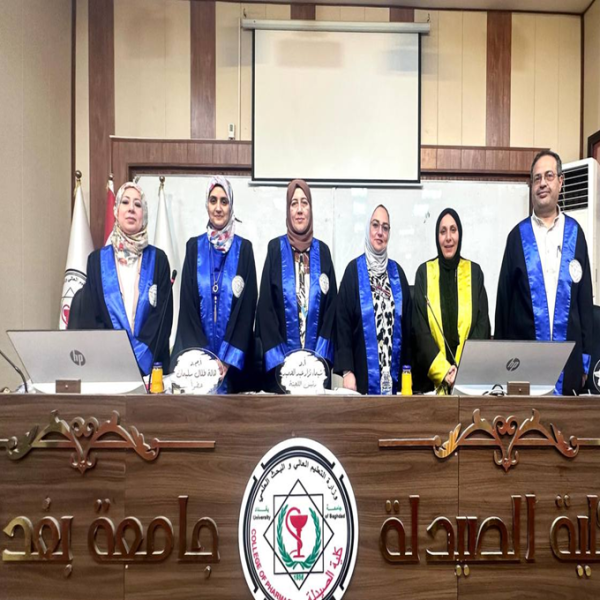The College of Pharmacy discussed the PhD dissertation entitled “Preparation and In-Vitro/In-Vivo Evaluation of Rizatriptan Benzoate Loaded Spanlastic Nanovesicles as a Nose to Brain Drug Delivery System” by the student Rajaa Abbas Dahash Altemimi and the supervisor, Professor Dr. Mowafaq M. Ghareeb, at the Pharmaceutics Department.
The study aimed to develop rizatriptan benzoate-loaded spanlastic nanovesicles using Span 60 and two different edge activators (Soluplus and Cremophor EL) for targeted nose-to-brain delivery and to evaluate their in vitro and in vivo performance.
The study included the preparation of 30 spanlastic formulas using the Box-Behnken design and ethanol injection method, optimization based on particle size, polydispersity index, and entrapment efficiency, evaluation of in vitro drug release, and zeta potential. The optimized formula was incorporated with mucoadhesive polymers for brain delivery and compared with intravenous rizatriptan benzoate in rats for pharmacokinetic analysis.
The results showed that optimized spanlastic formula had the highest entrapment efficiency and released 89.47% of rizatriptan benzoate after 6 hours in vitro. In vivo studies confirmed that mucoadhesive spanlastics were biocompatible and caused no nasal tissue irritation.
The study recommended the continuation of research on the successful and optimized formulations, both in vitro and in vivo, to further enhance their properties—aiming to prolong drug release time, reduce the frequency of daily administration, and improve patient compliance. It also emphasized the need for conducting long-term stability assessments and estimating the expiration date of the optimized formulation.




